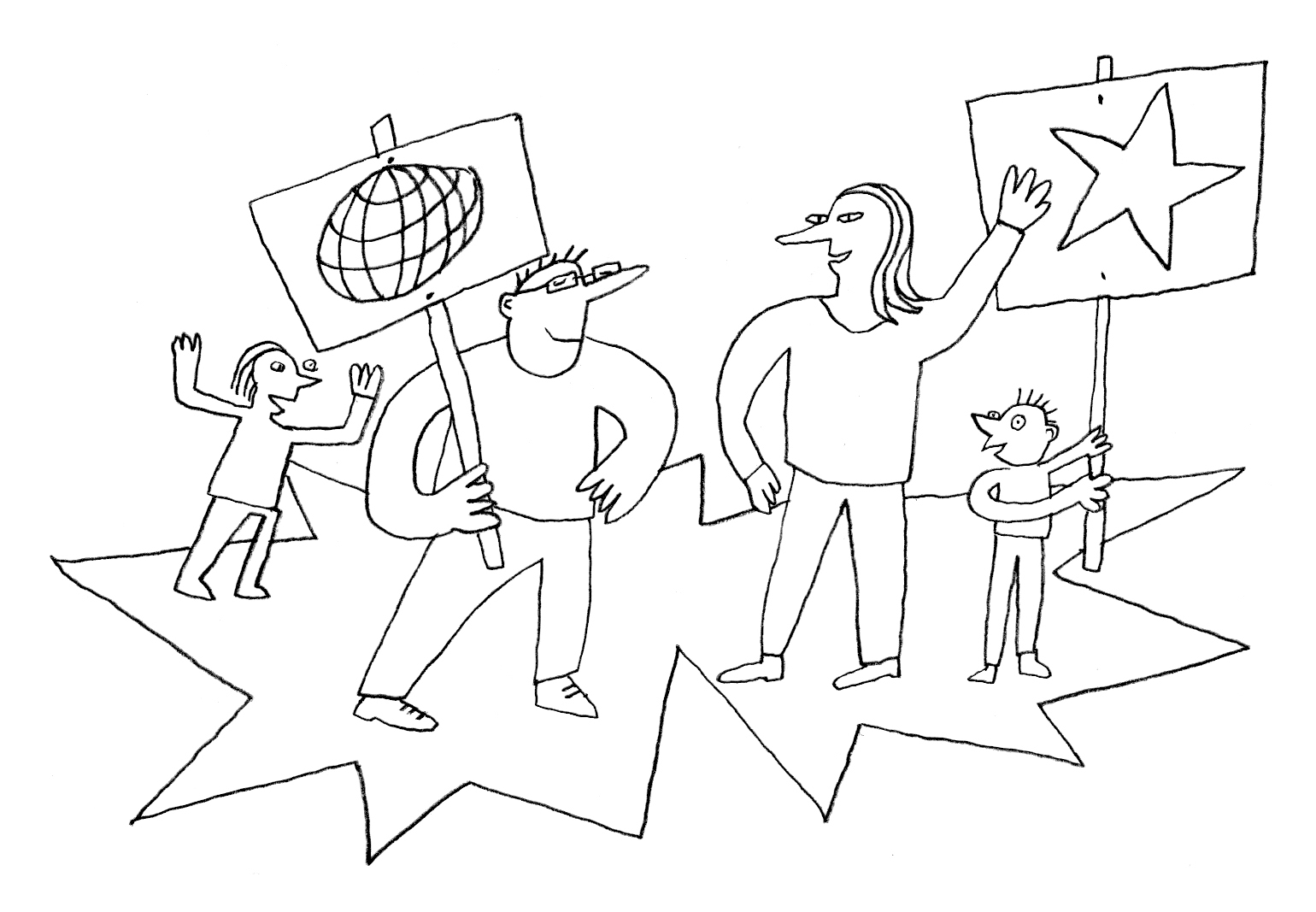Chapter 7 – Taking part in politics
Living Democracy » Textbooks » Chapter 7 – Taking part in politics
Introduction
The picture shows a man and a woman, supported by a giri and a boy, advocating their causes in public. The man’s poster shows the globe as a symbol of the world, while the woman is drawing attention to the five-pointed star on her poster, held by the boy supporting her. Perhaps this symbol corresponds to the surface they are standing on. Their expressions are friendly there is no sign of hostility. Adults and children are taking part in politics. They are making use of their right to demonstrate peacefully in public. Both sides are mixed in gender, therefore no gender issue is at stake. The two groups are competing – for attention and support by the majority. They are in direct confrontation, so no media, political parties or interest groups are involved.
The four people are standing on a surface resembling an irregularly pointed star. This symbol may be read in different ways. It may stand for the community that gives its citizens a sense of belonging together and that also provides a framework for rights, responsibilities and duties. The star could also resemble “the floor” that a citizen takes when speaking in public. Whoever chooses to stay off this floor will not be heard and must accept the decisions that are finally made. Citizens can take part in politics in many ways. EDC/HRE focuses on ways of active, direct participation. Taking part in politics is a right of children, not only of adults. To do so requires an understanding of the issue and careful judgment. Political participation in democracy needs to be taught in schools, which in turn requires schools to function as micro-societies that give students the opportunity to participate in managing their school affairs.
Both in democratic schools and democratic society, argument and controversy, even quarrel and conflict, are nothing to be feared but should be seen as something normal, even useful in democratic decision making. Settling clashes of ideas and interests are the basic method of solving problems and making decisions. If interests and objections are not articulated, they cannot be taken into account. In an open society, harmony – the “common good” – cannot be imposed, but needs to be negotiated. Controversy and conflict are not harmful if set in and supported by a culture of argument, conflict resolution and compromise.
The exercises focus on framework conditions and modes of political participation. This helps the students to appreciate their opportunities to participate in their community.
- Exercise 7.1. - The wall of silence
Educational objective The students become aware of their concepts of democracy. Resources Pieces of flipchart paper fixed to the wall and markers...
- Exercise 7.2. - My feelings about dictatorship
Educational objectives The students can define and judge elements of democracy and dictatorship. The students can make a deliberate choice of values...
- Exercise 7.3. - Questionnaire on attitudes to change
Educational objectives The students can reflect their personal attitudes and express them freely. The students can listen to other students, regardless of...
- Exercise 7.4. - The planning project6
Educational objectives The students understand the structures of mutual dependence in a community during a period of change. The students understand that...
- Exercise 7.5. - We and the world
Educational objectives The students examine how other countries and remote events affect their community. The students understand better the structure of interdependence...
- Exercise 7.6. - Should we take part in politics?
Educational objectives The students form their opinions as to whether it is important to participate in government Participation can take place in...
- Exercise 7.7. - How does government affect your life?
Educational objectives The students understand that government affects our lives in almost every aspect imaginable (tua res agitur). The world we live...
- Exercise 7.8. - Ways of participating in democracy
Educational objective The students relate different forms of political participation to human rights. Resources List of possible forms of political participation. Procedure...
- Exercise 7.9. - The policy cycle
Educational objectives The students are able to apply the model of the policy cycle to examples of decision-making processes. The students become...

